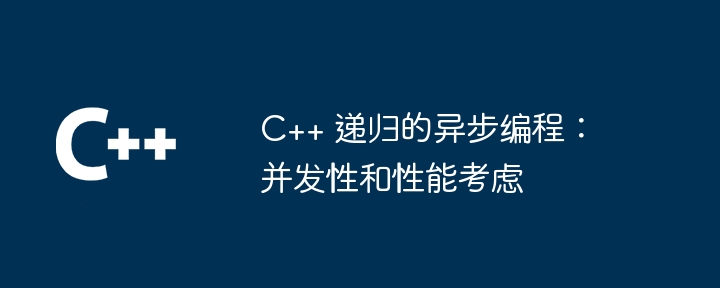
In modern C, recursive asynchronous programming adopts the language's functional features and concurrency primitives to decompose asynchronous tasks into recursive calls to achieve concurrency, thereby providing higher throughput, responsiveness, and resource utilization. However, there are performance considerations for calling and memory overhead. Practical example: The merge sort algorithm parallelized using the std::async() function demonstrates the application of recursive asynchronous programming in solving real-world problems.

Recursive asynchronous programming in C: Concurrency and performance considerations
In modern C, recursive asynchronous programming provides a A powerful way to handle concurrent tasks that leverages the functional nature of the language and powerful concurrency primitives. This article will explore the technology of recursive asynchronous programming and demonstrate its application in solving real-world problems through practical cases.
Principles of recursive asynchronous programming
Recursive asynchronous programming achieves concurrency by decomposing asynchronous tasks into the form of recursive calls. This can be achieved by using the coroutine library or the native async() function and future object.
Advantages of concurrency
Performance Considerations
However, there are the following performance considerations to consider when using recursive asynchronous programming:
Practical Case: Merge Sort
To illustrate the practical application of recursive asynchronous programming, let us consider a parallel implementation of the merge sort algorithm. Merge sort recursively divides an array into smaller subarrays, merges them, and then merges them again.
The following C code uses the std::async() function to parallelize the merge sort:
#include <future>
#include <vector>
// 并行归并排序函数
std::vector<int> async_merge_sort(const std::vector<int>& arr) {
// 递归基线条件
if (arr.size() <= 1) {
return arr;
}
// 将数组分为两半
size_t mid = arr.size() / 2;
std::vector<int> left_half = std::vector(arr.begin(), arr.begin() + mid);
std::vector<int> right_half = std::vector(arr.begin() + mid, arr.end());
// 异步调用归并排序子任务
auto left_future = std::async(async_merge_sort, std::move(left_half));
auto right_future = std::async(async_merge_sort, std::move(right_half));
// 等待子任务完成并合并结果
std::vector<int> left_sorted = left_future.get();
std::vector<int> right_sorted = right_future.get();
return merge(left_sorted, right_sorted);
} In this example, the merge sort algorithm is recursively applied to the array half. Subtasks run concurrently using the std::async() function, and then their parallel results are merged. In this way, the algorithm can take full advantage of the computer's multiple cores, thereby improving the overall performance of merge sort.
The above is the detailed content of Recursive Asynchronous Programming in C++: Concurrency and Performance Considerations. For more information, please follow other related articles on the PHP Chinese website!
 What are the differences between c++ and c language
What are the differences between c++ and c language
 Recommended learning order for c++ and python
Recommended learning order for c++ and python
 Cost-effectiveness analysis of learning python and c++
Cost-effectiveness analysis of learning python and c++
 Is c language the same as c++?
Is c language the same as c++?
 Which is better to learn first, c language or c++?
Which is better to learn first, c language or c++?
 The difference and connection between c language and c++
The difference and connection between c language and c++
 C++ software Chinese change tutorial
C++ software Chinese change tutorial
 Cost-effectiveness analysis of learning python, java and c++
Cost-effectiveness analysis of learning python, java and c++




